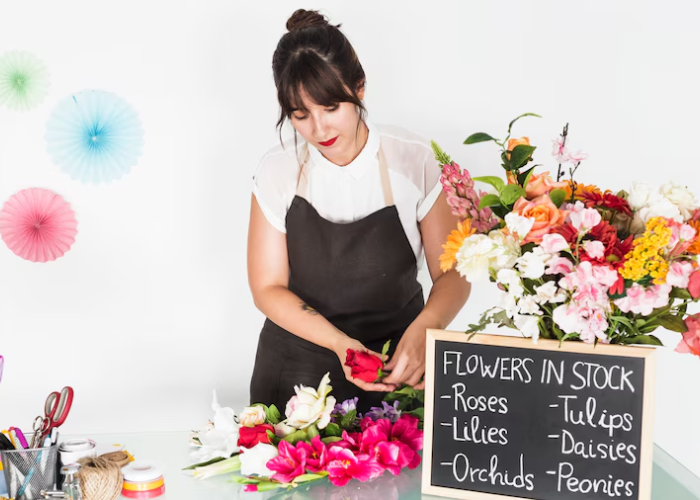Starting or operating a flower shop comes with unique risks that require specialized protection. Florist business insurance is not just a regulatory requirement in many states—it’s a critical investment that safeguards your floral enterprise against unexpected financial losses. Whether you’re arranging delicate wedding bouquets or managing heavy inventory deliveries, the right insurance coverage ensures your business can bloom even when challenges arise.
Must Read:DDF Busy: Complete Guide to Drug and Disease Free Dating for Busy Singles | 2025
Understanding florist business insurance can seem overwhelming, but this comprehensive guide will walk you through everything you need to know to make informed decisions about protecting your flower shop. From essential coverage types to cost-saving strategies, we’ll explore how proper insurance coverage can provide peace of mind while you focus on creating beautiful floral arrangements.

Understanding Florist Business Insurance Fundamentals
Florist business insurance encompasses various coverage types designed to protect flower shops from industry-specific risks. Unlike general business insurance, policies for florists account for unique challenges such as perishable inventory, seasonal fluctuations, delivery operations, and the physical demands of handling floral arrangements.
The floral industry faces distinct risks that standard business insurance might not adequately cover. These include spoilage of temperature-sensitive inventory, injuries from thorns and sharp tools, property damage during delivery, and liability issues related to allergic reactions or event mishaps. Professional florist business insurance addresses these specialized concerns while providing comprehensive protection for your investment.
Modern florist business insurance policies are designed to be flexible and scalable, allowing flower shop owners to customize coverage based on their specific operations. Whether you operate a small neighborhood flower shop, manage a large wholesale floral operation, or specialize in wedding and event services, there’s an insurance solution tailored to your needs.
Essential Types of Florist Business Insurance Coverage
General Liability Insurance
General liability insurance forms the foundation of most florist business insurance policies. This coverage protects your flower shop against third-party claims for bodily injury, property damage, and personal injury. For florists, this might include situations where a customer slips on water in your shop, experiences an allergic reaction to flowers, or claims that a delivery damaged their property.
The importance of general liability coverage extends beyond your physical shop location. It provides protection during off-site events, deliveries, and consultations. Given that florists often work in various venues and handle potentially hazardous materials like plant preservatives and floral foam, this coverage is essential for comprehensive protection.
Commercial Property Insurance
Your flower shop’s physical assets represent a significant investment that requires protection. Commercial property insurance covers your building, equipment, inventory, and furnishings against risks like fire, theft, vandalism, and severe weather. For florists, this coverage is particularly crucial due to the perishable nature of inventory and specialized equipment like refrigeration units and delivery vehicles.
This insurance typically covers replacement costs for damaged or destroyed property, helping ensure business continuity after a covered loss. Some policies also include coverage for income loss during the period when your shop is being repaired or rebuilt, which can be vital for maintaining financial stability.
Workers’ Compensation Insurance
For floral shops, workers’ compensation insurance costs an average of $172 per month, or $2,057 per year. This coverage is mandatory in most states for businesses with employees and provides essential protection for workplace injuries and illnesses.
Florist employees face various occupational hazards, including back injuries from lifting heavy arrangements, cuts from thorns and tools, and potential allergic reactions to flowers and chemicals. Workers’ compensation insurance covers medical expenses, disability benefits, and lost wages, protecting both your employees and your business from costly workplace injury claims.
Product Liability Insurance
Product liability insurance is crucial for florists because it protects against claims related to the products you sell or create. This coverage becomes particularly important when dealing with potentially toxic plants, preserved flowers treated with chemicals, or arrangements that might cause allergic reactions. If a customer claims that your floral arrangement caused illness or injury, product liability insurance provides essential legal and financial protection.
This coverage extends to situations where floral preservatives, plant food, or other products you sell cause damage or harm. Given the increasing awareness of allergies and chemical sensitivities, product liability insurance has become an increasingly important component of comprehensive florist business insurance coverage.
Business Owner’s Policy (BOP)
Flower shops pay an average of $73 per month, or $879 per year, for a business owner’s policy. A Business Owner’s Policy combines general liability and commercial property insurance into a single, cost-effective package designed specifically for small to medium-sized businesses.
BOPs are particularly popular among florists because they provide comprehensive coverage while often offering cost savings compared to purchasing separate policies. These policies can be customized with additional coverages specific to the floral industry, making them an efficient choice for many flower shop owners.
Cost Analysis of Florist Business Insurance
Understanding the financial investment required for proper insurance coverage helps florists budget effectively and make informed decisions about their protection needs. Florist Insurance can cost as little as $25 per month. However, costs vary significantly based on factors such as business size, location, coverage limits, and specific risks.
Several factors influence florist business insurance premiums. Business size and revenue directly impact costs, with larger operations typically paying higher premiums due to increased exposure. Geographic location affects rates due to varying risks like natural disasters, crime rates, and local regulations. The scope of operations, including delivery services, event work, and wholesale activities, also influences premium calculations.
Your claims history and risk management practices significantly impact insurance costs. Florists who implement safety protocols, maintain clean facilities, and have minimal claims history often qualify for lower premiums. Additionally, the amount of coverage you choose and your deductible levels directly affect your monthly or annual insurance costs.
Industry-specific factors also influence florist business insurance costs. Seasonal fluctuations in revenue, the perishable nature of inventory, and the physical demands of the work all contribute to risk assessments. Insurance companies consider these factors when determining premiums, making it important to work with insurers who understand the floral industry.

Factors Affecting Florist Insurance Premiums Florist Business Insurance
Location plays a crucial role in determining florist business insurance costs. Urban areas with higher crime rates or increased liability risks typically result in higher premiums. Conversely, rural locations might face different challenges such as limited emergency services or weather-related risks that could affect coverage costs.
Business operations and services offered significantly impact insurance premiums. Florists who provide delivery services face additional risks related to vehicle operation and off-site work. Those specializing in wedding and event services encounter different liability exposures compared to retail-focused flower shops. Wholesale operations dealing with larger volumes and commercial clients face their own unique risk profiles.
The condition and security of your business premises affect insurance costs. Well-maintained facilities with modern security systems, proper lighting, and safety equipment often qualify for lower premiums. Regular maintenance of refrigeration systems, proper storage of chemicals and tools, and implementation of safety protocols demonstrate risk management commitment to insurers.
Employee training and safety programs can positively impact insurance costs. Documented training programs covering proper lifting techniques, tool safety, chemical handling, and customer service can reduce the likelihood of claims and demonstrate your commitment to risk reduction.
How to Choose the Right Florist Business Insurance
Selecting appropriate florist business insurance requires careful assessment of your specific risks and business operations. Start by conducting a thorough risk analysis that considers your physical location, types of services offered, employee count, and annual revenue. This analysis forms the foundation for determining necessary coverage types and appropriate limits.
Consider your business’s unique characteristics when evaluating insurance options. Seasonal businesses might need flexible coverage that adjusts with revenue fluctuations. Delivery-focused operations require robust commercial auto coverage, while event specialists need comprehensive liability protection for off-site work.
Work with insurance providers who understand the floral industry’s specific challenges and requirements. Specialized insurers often offer better coverage options and more competitive rates because they understand industry risks and can structure policies accordingly. They’re also more likely to provide valuable risk management resources and claims support tailored to florists.
Review and compare multiple insurance quotes to ensure you’re getting the best value for your coverage needs. Don’t simply choose the lowest premium; instead, evaluate the overall value proposition including coverage breadth, insurer reputation, claims handling, and customer service quality.
Common Claims in the Floral Industry Florist Business Insurance
Understanding common insurance claims in the floral industry helps illustrate why specific coverage types are essential. Slip and fall incidents represent one of the most frequent claims, often occurring when customers encounter wet floors from watering activities or spilled water from floral displays. These incidents can result in significant medical expenses and potential lawsuits.
Property damage claims frequently involve delivery-related incidents where floral arrangements or delivery vehicles cause damage to customer property. Water damage from broken vases, stains from flower dyes, or accidents during setup can result in costly property damage claims that general liability insurance helps address.
Product-related claims might involve allergic reactions to flowers, skin irritation from plant materials, or illness allegedly caused by treated flowers or chemicals. While these claims may be unfounded, defending against them requires significant legal resources that product liability insurance covers.
Workers’ compensation claims in the floral industry often involve back injuries from lifting heavy arrangements, cuts from thorns or tools, and repetitive stress injuries from detailed handwork. The physical nature of floral work makes workers’ compensation coverage particularly important for protecting both employees and business owners.
Risk Management Strategies for Florists
Implementing effective risk management strategies not only protects your business but can also help reduce insurance premiums over time. Maintaining clean, well-organized work areas reduces slip and fall risks while creating a professional environment that customers appreciate. Regular cleaning schedules, proper drainage systems, and immediate cleanup of spills demonstrate commitment to safety.
Employee training programs covering safety Florist Business Insurance protocols, proper lifting techniques, and tool usage help prevent workplace injuries. Regular training updates ensure employees stay current with best practices and safety procedures. Documented training programs also demonstrate your commitment to risk reduction to insurance providers.
Proper equipment maintenance is crucial for preventing accidents and equipment failures. Regular servicing of refrigeration units, delivery vehicles, and tools helps prevent breakdowns that could result in inventory loss or safety hazards. Maintenance records provide valuable documentation for insurance claims and demonstrate responsible business management.
Customer communication about potential allergies and sensitivities helps prevent product-related claims. Clear signage about common allergens, proper handling instructions for arrangements, and documentation of customer requests or restrictions provide important protection against liability claims.
Legal Requirements and Compliance Florist Business Insurance
Understanding legal requirements for florist business insurance helps ensure compliance and avoid penalties. While business insurance laws vary between states, it’s likely that if you have employees, you’ll be required to have workers comp coverage. Most states mandate workers’ compensation insurance for businesses with employees, with penalties for non-compliance including fines and potential business closure.
Commercial auto insurance is required in all states for business Florist Business Insurance vehicles, with minimum coverage requirements varying by location. Florists using vehicles for deliveries must maintain appropriate commercial coverage to comply with legal requirements and protect against liability.
Some localities require general liability insurance for business licenses or permits. Wedding venues and event spaces often require florists to carry specific liability coverage and name them as additional insureds before allowing access to their facilities. Understanding these requirements helps ensure you maintain appropriate coverage levels.
Professional licensing requirements may include insurance obligations. Some states require specific insurance coverage for businesses handling potentially hazardous materials like floral preservatives and pesticides. Staying informed about changing regulations helps ensure ongoing compliance.

Tips for Reducing Florist Insurance Costs
Several strategies can help reduce florist business insurance costs without compromising essential protection. Implementing comprehensive safety programs demonstrates risk management commitment and may qualify your business for premium discounts. Regular safety training, documented procedures, and incident reporting systems show insurers your proactive approach to risk reduction.
Bundling multiple insurance policies with the same provider often Florist Business Insurance results in significant cost savings. Many insurers offer discounts for customers who purchase multiple coverage types, making Business Owner’s Policies particularly cost-effective for smaller florists.
Maintaining a good claims history helps keep premiums low over time. While some claims are unavoidable, proactive risk management and prompt attention to potential hazards help minimize claim frequency and severity. Working with your insurance provider to understand claim prevention strategies benefits both parties.
Regular policy reviews ensure you’re not paying for unnecessary coverage while maintaining adequate protection. As your business grows or changes focus, your insurance needs may evolve. Annual reviews with your insurance agent help optimize coverage and identify potential cost savings.
Frequently Asked Questions About Florist Business Insurance
1. What is the minimum insurance coverage required for florists?
The minimum insurance requirements for florists vary by state and business structure. Most states require workers’ compensation insurance if you have employees, and commercial auto insurance if you use vehicles for business purposes. While general Florist Business Insurance liability insurance isn’t always legally required, many venues, event spaces, and commercial clients require proof of liability coverage before working with florists. Additionally, if you have a business loan or lease commercial space, your lender or landlord may require specific insurance coverage. It’s recommended to consult with a licensed insurance agent familiar with your state’s requirements and your specific business operations to ensure compliance.
2. How much does florist business insurance typically cost?
Florist business insurance costs vary significantly based on multiple factors, but current industry data provides helpful benchmarks. Flower shops pay an average of $73 per month, or $879 per year, for a business owner’s policy. Florist Insurance can cost as little as $25 per month. Workers’ compensation insurance averages around $172 per month for floral shops. Total insurance costs typically range from $80 to $300+ per month Florist Business Insurance depending on coverage types, business size, location, and risk factors. Factors affecting costs include annual revenue, number of employees, types of services offered, claims history, and chosen deductibles. Working with specialized insurance providers who understand the floral industry often results in more competitive rates.
3. Do I need separate insurance for delivery operations?
Yes, delivery operations require specific insurance considerations that standard florist policies may not fully address. Commercial auto insurance is essential for any vehicles used for business deliveries, as personal auto policies typically exclude business use. This coverage should include liability, collision, and comprehensive protection for delivery vehicles. Additionally, goods in transit coverage protects floral arrangements during Florist Business Insurance transportation, while hired and non-owned auto coverage protects against liability when employees use personal vehicles for deliveries. Some florists also need commercial umbrella policies to provide additional liability protection for delivery-related risks. The specific coverage needed depends on whether you own delivery vehicles, use employee vehicles, or contract with third-party delivery services.
4. Does florist insurance cover spoiled or damaged inventory?
Coverage for spoiled or damaged inventory depends on the specific policy and circumstances involved. Commercial property insurance typically covers inventory damaged by covered perils such as fire, theft, vandalism, or certain weather events. However, standard policies usually exclude spoilage due to mechanical breakdown of refrigeration equipment unless you purchase specific equipment breakdown coverage. Some policies offer limited coverage for power outages, but this often requires additional endorsements. Perishable goods coverage can extend protection to include spoilage from various causes. It’s important to review policy terms carefully and consider additional coverages if inventory protection is a priority for your business operations.
5. Can I get discounts on florist business insurance?
Yes, several discount opportunities are available for florist business insurance. Safety and risk management programs often qualify for premium reductions, including documented employee training, safety protocols, and claims prevention measures. Bundling multiple policies with the same insurer typically provides package discounts. Many insurers offer claims-free discounts for businesses with good loss histories. Professional association memberships sometimes provide group insurance discounts. Installing security systems, fire suppression equipment, or other risk-reducing measures may qualify for additional discounts. Florist Business Insurance Payment method discounts are often available for annual payments versus monthly installments. Higher deductibles can reduce premiums, though this increases out-of-pocket costs for claims. Working with an experienced agent helps identify all available discount opportunities for your specific situation.
Conclusion
Florist business insurance represents a critical investment in your flower shop’s long-term success and stability. The unique risks facing floral businesses—from perishable inventory and seasonal fluctuations to delivery operations and event services—require specialized coverage that generic business insurance simply cannot provide adequately.
The relatively modest cost of comprehensive florist business insurance, averaging $73-$172 per month for essential coverage, pales in comparison to the potential financial devastation of an uninsured loss. Whether facing a liability lawsuit, property damage, or workers’ compensation claim, proper insurance Florist Business Insurance coverage ensures your business can weather unexpected challenges and continue serving customers.
As the floral industry continues to evolve with changing consumer preferences and business models, having adaptable insurance coverage becomes even more important. Working with knowledgeable insurance providers who understand your industry’s specific challenges helps ensure your coverage evolves with your business needs.
Take action today to protect your floral business investment. Contact a licensed insurance agent specializing in florist business insurance to discuss your specific needs and obtain competitive quotes. Your flower shop’s future depends on the protection you put in place today—don’t let inadequate insurance prevent your business from blooming to its full potential.



